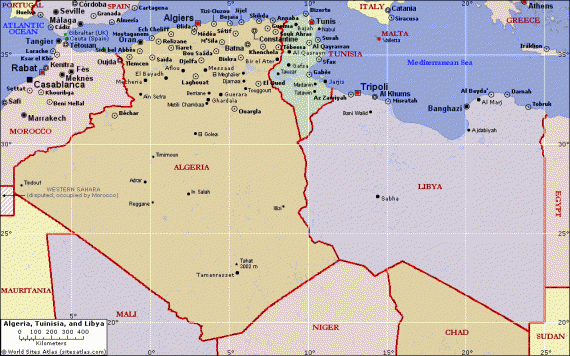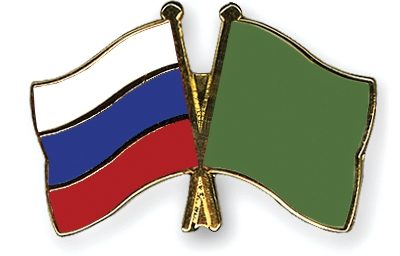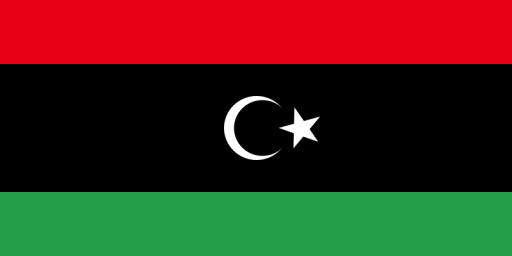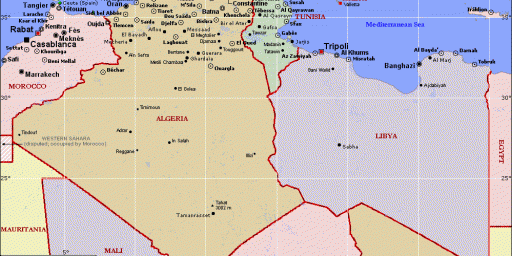NATO Running Short On Some Bombs In Libya
Apparently, there wasn’t that much advance panning for the mission over Libya:
Less than a month into the Libyan conflict, NATO is running short of precision bombs, highlighting the limitations of Britain, France and other European countries in sustaining even a relatively small military action over an extended period of time, according to senior NATO and U.S. officials.
The shortage of European munitions, along with the limited number of aircraft available, has raised doubts among some officials about whether the United States can continue to avoid returning to the air campaign if Libyan leader Moammar Gaddafi hangs on to power for several more months.
U.S. strike aircraft that participated in the early stage of the operation, before the United States relinquished command to NATO and assumed what President Obama called a “supporting” role, have remained in the theater “on 12-hour standby” with crews “constantly briefed on the current situation,” a NATO official said.
So far, the NATO commander has not requested their deployment. Several U.S. military officials said they anticipated being called back into the fight, although a senior administration official said he expected other countries to announce “in the next few days” that they would contribute aircraft equipped with the laser-guided munitions.
Opposition spokesmen in the western Libyan city of Misurata, under steady bombardment by government shelling, said Friday that Gaddafi’s forces had used cluster bombs, and Human Rights Watch said its representatives on the ground had witnessed the explosion of cluster munitions in civilian areas there. The Libyan government denied the weapons had been used.
A spokesman for the Misurata City Council appealed for NATO to send ground troops to secure the port that is the besieged city’s only remaining humanitarian lifeline.
The opposition has also repeatedly called for an increase in NATO airstrikes. The six countries conducting the air attacks, led by Britain and France, were unsuccessful at a meeting this week in Berlin in persuading more alliance members to join them.
NATO officials said that their operational tempo has not decreased since the United States relinquished command of the Libya operation and withdrew its strike aircraft at the beginning of April. More planes, they said, would not necessarily result immediately in more strike missions.
But, they said, the current bombing rate by the participating nations is not sustainable. “The reason we need more capability isn’t because we aren’t hitting what we see — it’s so that we can sustain the ability to do so. One problem is flight time, the other is munitions,” said another official, one of several who were not authorized to discuss the issue on the record.
European arsenals of laser-guided bombs, the NATO weapon of choice in the Libyan campaign, have been quickly depleted, officials said. Although the United States has significant stockpiles, its munitions do not fit on the British- and French-made planes that have flown the bulk of the missions.
Bruce McQuain quips:
Given this little discovery, I’d guess NATO has some standardization to do? You know, that’s why we have standard size rounds, artillery shells, etc.
You’d think they’d have thought of this before (and yes, before someone informs me, France is not a member of NATO), wouldn’t you?
One would think so.






France isn’t a member of NATO? Someone should let Sarkozy know that.
France’s military has been independent of NATO since the de Gaulle era I believe
It would be better to research the question and talk about what you know, instead of just depending on what you believe, which is incorrect (or rather, dated).
LMGTFY:
Sarkozy returned France to the integrated command structures when he became President. France never stopped being a member of NATO, still had a voice at the North Atlantic Council, still participated in NATO ops in the Balkans, including leading sectors in Bosnia and Kosovo. So the statement above is simply wrong.